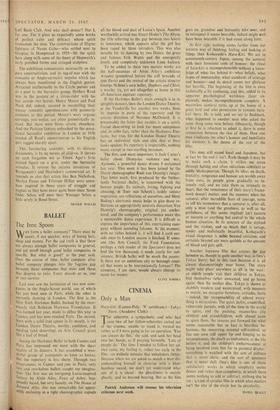BALLET The Iron Spoon
WHY form a ballet company? There must be easier, if not quicker, ways of losing hair, sleep and money. For the sad truth is that there are always enough ballet companies in general, and yet never enough good ballet companies in specific. But what is good? as the poet said. Over the course of time, ballet company after ballet company plunges into the fugitive gap between those companies that exist and those that deserve to exist. Every decade or so, one or two survive.
Last year saw the formation of two new corn- Panics in the Anglo-Saxon world, one of which has just been seen in Paris. while the other is currently dancing in London. The first is the New York Harkness Ballet, backed by the enor- mously rich Rebekah Harkness Foundation. It was formed last year, made its debut this year in Cannes, and has now reached Paris. The second, born with a solid iron spoon in its mouth, is the London Dance Theatre, worthy, confident, and needing (and deserving) an Arts Council grant like a loaf of bread.
Seeing the Harkness Ballet in both Cannes and Paris has impressed me most with the sheer quality of its dancers. It has assembled a won- derful group of youngsters as keen as knives. But the repertory is less sharp. Through two Programmes in Cannes and cone in Paris. only two and two-halves ballets caught my imagina- tion. The first was an intriguing Lorca-inspired fantasy by Alvin Ailey, Feast of Ashes. Sup- Posedly based, but very loosely, on The House of Bernard Alba, this was remarkable for appar- ent!), enclosing in a tight choreographic capsule all the blood and dust of Lorca's Spain. Another worthwhile arrival was Stuart Hodes's The Abyss, the title referring to the gap between two lovers in innocence, which appears after the girl has been raped by three intruders. This was also notable for its dancing by two Danes, the great and famous Erik Bruhn and the emergently lovely and completely unknown Lone Isaksen.
To be added to these two mature works are the half-successes of Alvin Ailey's ambitious A tiadne (premiered before the stiff brocade of lout Paris) and the revival of the artistic director George Skibine's own ballet, Daphnis and Chloe, a worthy try, yet not altogether at home in this all-American aspirant repertory.
If the Harkness Ballet's main strength is in its sprightly dancers, then the London Dance Theatre, at the Vaudeville for another two weeks, finds its impetus in parts of the repertory and the artistic direction of Norman McDowell. It is presumably the latter that enables it on a sorely frayed shoe-string to look far more sumptuous and, in sober fact, richer than the Harkness. Fan- tastic, but true, for the London Dance Theatre has an individual style and chic that, at least looks opulent. Its repertory is respectable, nothing more, except in two startling instances.
The first, and most important, is Jack Carter's ballet about Dionysiac violence and war, A solonifi, a powerful dance drama I welcomed last year. This week it has been joined by the Dutch choreographer Rudi van Dantzig's Jangle. This bitter work, first produced by the Nether- lands National . Ballet, is concerned with the human jungle. Its animals, loving, fighting and cheating, in Toer van Schayk's lushly sinister vegetation, are reflections of ourselves, and Henk Bading's electronic music helps to give those re- flections an appropriately neurotic distortion. Van Dantzig's choreography, original yet unclut- tered, and the company's performance make this a memorable dance experience. It is difficult to express the importance of this entertaining com- pany without sounding fulsome. At the moment, with no riches behind it, it will find it cold out- side once its London season is finished. If some- one (the Arts Council, the Ford Foundation, perhaps a rich reader of the Spectator) does not find the few thousands it needs yearly for sub- sistence, British ballet will be much the poorer. Is there not an ambitious city or borough coun- cil that wants to be internationally famous? The company, I am sure, would always change its name for money.
CI .WE BARNES














































 Previous page
Previous page